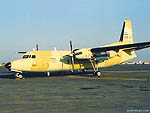Iranian plane buzzes carrier in Middle East
 An Iranian maritime patrol aircraft buzzed the carrier Dwight D. Eisenhower at sea in the Middle East last week, passing within 1,000 yards of the ship, but American defense officials sought to downplay the encounter as relatively common.
An Iranian maritime patrol aircraft buzzed the carrier Dwight D. Eisenhower at sea in the Middle East last week, passing within 1,000 yards of the ship, but American defense officials sought to downplay the encounter as relatively common.
The Iranian navy Fokker F27 turboprop reconnaissance plane had been flying near the Eisenhower Strike Group for about 20 minutes before it made its low pass on April 21, according to a defense official who was not authorized to talk publicly about the incident and asked not to be identified. The official did not know if the Eisenhower took any defensive actions, such as changing course or ordering its fighters to escort the intruder away. No one was hurt and the Iranian aircraft soon retired.
The Eisenhower and its escorts had been tracking the Fokker surveillance plane the entire time, the defense official said; it didn’t try to pop up from low altitude or surprise them. There was no information about exactly where the encounter took place — for example, in the Persian Gulf or the Gulf of Oman — but the official said it happened in “international waters.”
“From our perspective, this is not something to get excited about — this is not out of the ordinary — this is within the bounds of what has happened in the past,” the official said.
The date of the fly-by would seem to put it near the start of a series of Iranian naval exercises that took place last week in the Persian Gulf; dubbed Great Prophet 5, the Iranian navy and the Iranian Revolutionary Guards Corps practiced small boat swarms and unveiled a new fast-attack missile craft.
Iranian ships and aircraft approach U.S. warships relatively often, apparently to test how they respond in close proximity. In 2008, Iranian speedboats darted among a formation of three American warships transiting through the Strait of Hormuz, which blasted a warning with their horns and went to flank speed to escape.
The Navy has a long history of sometimes tense encounters at sea, including years’ worth of jousting between carrier aircraft and Russian Tu-95 bombers, whose crews liked to get as close as possible to U.S. carriers during the Cold War. When two Russian bombers buzzed the carrier Nimitz in the Pacific in 2008, Chief of Naval Operations Adm. Gary Roughead said at the time it didn’t worry him — “they were stretching their wings, so to speak.”